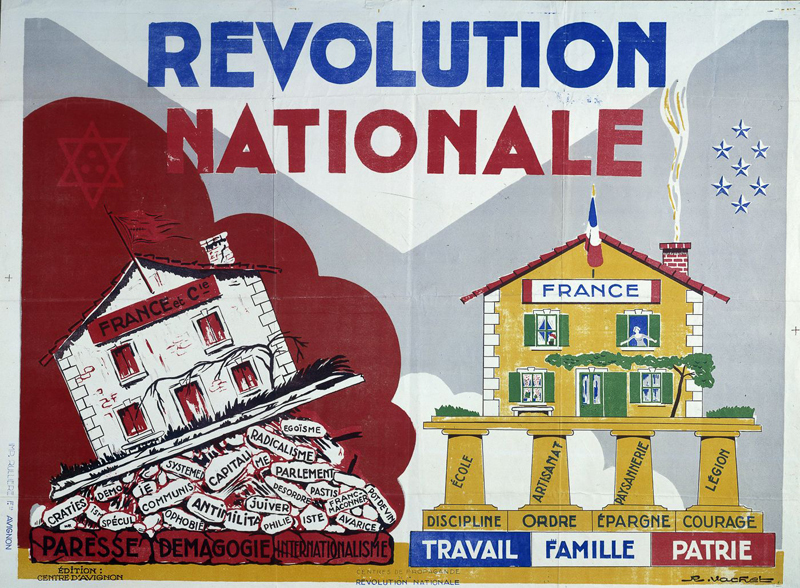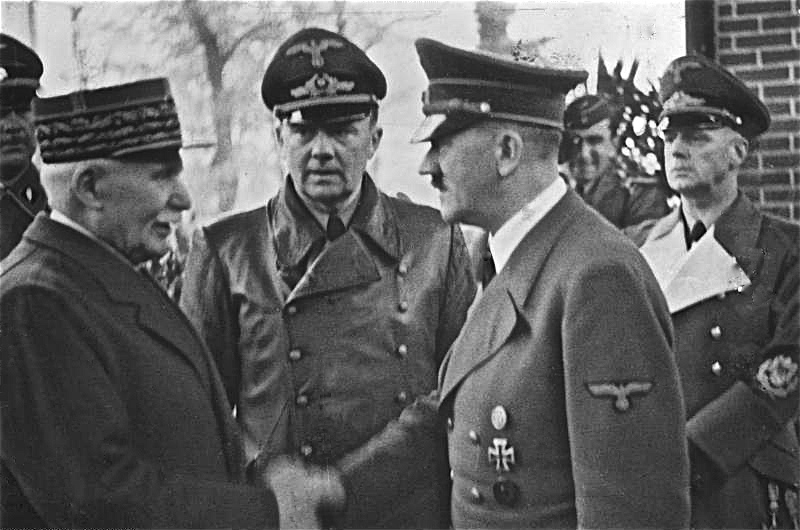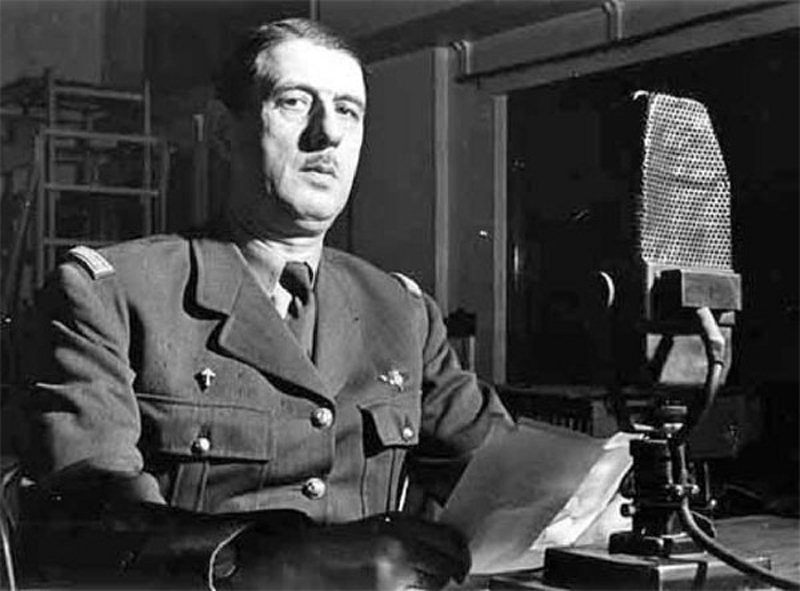 Menu
Menu
 Menu
Menu
In a democracy, the people decide. Can the people decide to vote democracy away?
France did not fare well in World War II. On May 9th, 1940 Nazi Germany marched into the Netherlands and Belgium, en route to France. By June 14th, Hitler’s armies successfully fought their way to Paris, perhaps the most admired city in the world. Left with few options, France accepted defeat on June 20th and signed an armistice agreement with Germany. Under the agreement, all of France would continue to be governed by the French, at least on paper.
In reality, France was carved into two pieces. The German military would occupy the north, known as Zone occupée. In Zone occupée, French rule was subject to intense German military oversight. The south of France, known as Zone libre, would be under full French control. France’s holdings in North Africa—Algeria, Tunisia, and Morocco—also remained in French hands. Algeria had been integrated into France in 1848, while Tunisia and Morocco were ruled by local monarchs under the thumb of French generals. To help maintain control, France was allowed to keep a small military. As well, a small southern corner of France was taken over by Italy.
Officially defeated, France’s lawmakers then did something extraordinary. Leading politicians said that France needed a new constitution. This was despite the armistice agreement requiring no such thing. On July 10th, France’s legislatures voted on whether or not they would end the democratic French Third Republic. This would clear the way for a new constitution.

A 1940s propaganda poster comparing Vichy to the Third Republic.
The vote that destroyed the Third Republic wasn’t even close. 569 legislators voted in favour of the proposal, 80 voted against. That said, 176 were absent: some were on a boat to North Africa with hopes of setting up a government-in-exile, a few were in jail, and some were in France but never showed up. If these absentees are factored in, it was still a landslide vote: almost 70% of France’s legislators were in favour of ending the Third Republic.
People used democracy to destroy democracy.
This vote to destroy a democracy has confounded people ever since. It has been argued that France’s democratic self-destruction was a betrayal committed by France’s political elite, who were seeking authoritarian power and closer ties with Nazi Germany. However, the move was widely supported by the public. Many common French people, tired of years of political gridlock and shocked by the country’s sudden military defeat, were willing to try something new. As historian Robert O. Paxton argues, France’s democratic suicide was “no revolution from above. It reflected almost unanimous French public opinion.”1
Another disturbing aspect of the vote is captured by legal scholar Vivian Grosswald Curran. She points out that the destruction came through legal and democratic means. As she put it,
France’s Parliament... committed institutional suicide by voting itself out of existence and creating a dictatorship, all in careful compliance with the French Third Republic’s legal procedure.2
In other words, people used democracy to destroy democracy. To be sure, not everyone agrees with Curran’s analysis. Nonetheless, the simple fact that almost 70% of France’s legislators voted to destroy one of the world’s most-established liberal democracies—with wide public support—should give us all reason for pause.
There is very little to admire about what replaced the French Third Republic. The new French State created shortly after the vote is commonly called Vichy France. Vichy is the name of the central French town where the new government was headquartered.

Vichy President Marshal Philippe Pétain meets Adolf Hitler, October 24th, 1940.
Philippe Pétain was appointed Vichy’s head of state. Pétain was a popular and elderly war hero, who helped lead France to victory against Germany in World War I. He was given full power to create a new constitution.
Pétain and his cabinet were hostile to the ideas of democracy and liberalism. They blamed liberal ideals for weakening France. His new French constitution embraced far-right authoritarianism. The national motto was changed from Liberté, Égalité, Fraternité (Liberty, Equality, Fraternity) to Travail, Famille, Patrie (Work, Family, Homeland). This program of reform was called Révolution nationale.
Révolution nationale was an enormous setback for human rights. Personal and political freedoms were taken away, the economy came under tight control, the media lost most of its independence, and new laws targeted Jews. In these regards, Vichy France began to look a lot like Nazi Germany. And Vichy often collaborated with the Nazis.
As terrible as these changes were, Pétain and his government held on to wide public support in first years. Popular opinion in France was that Germany was going to win the war, so they may as well get on board with the coming European order.
Of course, not everyone supported Vichy. An underground opposition movement called the French Resistance formed. Historians have struggled to determine the number of people actively involved: estimates range from 2% to 20% of the population.
Some were resisters with a lowercase r. These resisters performed isolated acts of defiance. This could be as simple as raising a French tricolour flag, or helping a person hide from Vichy police. They never affiliated with a particular group. Capital R Resisters were active fighter groups. They formed and plotted underground, sabotaging the enemy, publishing newspapers, and helping the Allies.
The French Resistance was a colourful group. Predominantly young, they came from all classes, backgrounds, beliefs, and even nationalities. Some joined early, others had supported Vichy but then switched sides. A single goal united them: resisting Naziism and Révolution nationale. As Resistance expert Ronald Rosbottom said, “It began from the ground up, which is what’s remarkable.... Courage was suddenly needed.”3

Charles de Gaulle speaking from the BBC in London. The BBC spread news and coded messages across France, often including instructions for Resistance fighters.
Leadership of the Resistance is often attributed to a young French general and junior government minister, Charles de Gaulle. De Gaulle rejected France’s armistice with Germany, fled to the UK, and set up a government-in-exile called Free France.
When de Gaulle fled, no other members of the French government came along. This put his leadership on shaky ground. A major step in de Gaulle establishing his authority came when the Allies took France’s African colonies from Vichy in November 1942. Free France could then establish a government in Algiers, then considered part of France.
When the National Council of the Resistance—a collection of resistance groups, political parties, and trade unions—formed in 1943, de Gaulle was officially recognised as the Resistance leader. Resistance became better-organised. This formal structure did not mean that all resisters marched to the same drum. The Resistance remained loose and unwieldy, but de Gaulle was its “leader.”
1 Robert O. Paxton. Vichy France: Old Guard and New Order, 1940-1944. Alfred A Knopf, 1972, p. 30.
2 Vivian Grosswald Curran. “The Legalization of Racism in a Constitutional State: Democracy’s Suicide in Vichy France,” Hastings Law Journal, vol. 50, 1998, p. 4.
3 quoted in Tenorio, Rich. “Teenagers helped launch the WWII French Resistance; many paid with their lives.” The Times of Israel, January 28, 2020.